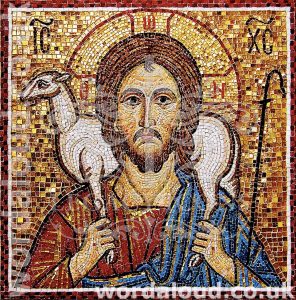Christian Art | Jesus Teaches Christians How To Pray | Sermon On The Mount
Office Of Readings | Week 30, Monday, Ordinary Time | A Reading From The Letter Of Pope Saint Clement I To The Corinthians | We Must Not Run Away From God’s Will
‘We must not turn our backs and flee from God’s will.’
Saint Clement reflects on the discipline of Christian life within the early Church, focusing on the relationship between divine presence, moral conduct, and communal order. He addresses the need to align human action with God’s will and to avoid hypocrisy or self-deception in faith.
Clement begins with an admonition concerning responsibility for divine blessings. The gifts of God are not presented as static possessions but as obligations that carry moral weight. Blessing may become condemnation if it is received without corresponding conduct. This establishes the principle that grace demands a practical and ethical response. The believer is not to rely on divine favour as assurance of safety but to live in a way consistent with its source.
The reading stresses the awareness of divine omniscience. God is described as searching the hidden places of the human heart, a formulation that draws upon biblical language from the Wisdom tradition. Knowledge of this interior scrutiny requires transparency of conscience. Since nothing is concealed from God, external compliance without inward integrity is meaningless. The emphasis is on sincerity rather than public conformity.
A contrast follows between the approval of God and the opinion of ‘stupid and foolish men’. The choice presented is between obedience to divine will and submission to human vanity. This introduces a social dimension to moral life: believers must be prepared to offend social pride if truth demands it. The community’s health depends on a hierarchy of loyalty, where divine judgement takes precedence over public esteem.
Clement then describes a network of relationships within the Christian body. He refers to authority, age, marriage and education, situating moral discipline within the structures of everyday life. Respect for presbyters, proper instruction of youth, and the formation of wives and children in reverence express a practical theology of order. The passage implies that holiness is maintained through patterns of conduct appropriate to each role. The tone is not speculative but prescriptive, defining the community as an organism held together by mutual duty.
The description of the household serves as a microcosm of the Church. Each person’s behaviour reflects and supports the moral condition of the whole. Clement’s references to chastity, gentleness, silence, and charity are presented not as private virtues but as public disciplines. Control of speech, equitable charity, and purity of intention demonstrate the unity between inner disposition and outward behaviour. This coherence is a central concern: the Spirit searches the heart, and hypocrisy disrupts the spiritual integrity of the body.
The reading grounds ethical instruction in faith and Scripture. Clement alludes to Psalm 34/33, invoking divine speech through the Holy Spirit. The citation frames moral exhortation within revelation. God’s word teaches the ‘fear of the Lord’, which is presented not as anxiety but as recognition of divine reality that leads to life and peace. The sequence ‘turn away from evil, do good, seek peace’ reflects an ordered vision of moral reform: avoidance, action, and pursuit.
Clement describes the divine character as merciful, generous, and good to those who approach with undivided hearts. The argument concludes with a warning against duplicity. Faith must be whole, not divided by mistrust or calculation. Clement’s concern is with integrity—between inner belief and outward conduct, between confession and behaviour, between individual and community.

A Reading From The Letter Of Pope Saint Clement I To The Corinthians | We Must Not Run Away From God’s Will
Dear friends take care that God’s blessings, which are many, do not become the condemnation of us all; we must live lives worthy of him and in mutual harmony do what is good and acceptable in his sight. He tells us: The Spirit of the Lord is a lantern, searching the hidden places of our inmost being.
We must remember how near he is and that no thought of ours, no conversation we hold is hidden from him. It is right, therefore, that we should not turn our backs and flee from God’s will. We should rather give offense to stupid and foolish men, puffed up and taking pride in their boastful speech, than give offense to God.
Let us reverence the Lord Jesus, whose blood was shed for us. Let us respect those in authority, let us honor the presbyters. Let us train the young in the fear of God. Let us lead our wives toward all that is good. Let them show by their conduct that they are lovers of chastity; by their gentleness let them reveal a pure and sincere disposition; by their silence let them manifest the control they have over their tongues; let them bestow an equal charity, without respect for persons, on all who have a holy fear of God.
Your children must share in the way of discipleship in Christ. They must learn how effective humility is before God, what chaste love can accomplish with God, how good and noble is the fear of God, for it brings salvation to all who possess it and who live holy lives with a pure heart. The one whose Spirit is in us is the searcher of our thoughts and of the counsels of our hearts. At his will, he shall take that Spirit from us.
All this is strengthened by the faith that comes to us in Christ. He himself addresses us through the Holy Spirit and says: Come, my children, listen to me: I will teach you the fear of the Lord. Is there a man who wants life, desiring to see good days? Keep your tongue from evil, and your lips from speaking what is false. Turn away from evil and do good. Seek peace and go in pursuit of it.
The Father is merciful in all he does and full of generosity; he is loving to those who fear him. In goodness and gentleness he gives his graces to those who approach him with undivided hearts. We must then put away all duplicity and not be distrustful in the face of his excelling and ennobling gifts.
Christian Prayer With Jesus
God of light,
You search the hidden places of the heart.
Teach us to live with integrity before you,
to speak truth,
to act in peace,
and to seek what is good in your sight.
Keep us from duplicity and pride.
Grant us unity with one another,
and constancy in the path of your will.
Through Christ our Lord.
Amen.
Glossary Of Christian Terms
Blessing – The favour or gift of God. In Clement’s use, blessing implies responsibility; it must be matched by conduct that honours its giver.
Will of God – The divine intention or purpose guiding creation and human life. Obedience to it defines faithful living.
Spirit of the Lord – The Holy Spirit, understood as God’s presence and activity within human beings and the Church.
Reverence – A posture of respect and awe before God, expressed through worship and obedience.
Presbyter – A term used in the early Church for elders or leaders responsible for pastoral care and teaching; later associated with priests.
Fear of God – Not terror, but recognition of divine majesty and moral seriousness; a disposition that leads to wisdom and humility.
Chastity – The right ordering of desire in body and mind; living in accordance with one’s state of life and vocation.
Charity – Love directed by faith; the practical expression of goodwill and care toward others without partiality.
Grace – The free gift of God’s life and help, enabling human beings to act rightly and to grow in holiness.
Duplicity – The division between inward intention and outward appearance; the opposite of sincerity before God.
Peace – The condition of harmony arising from right relationship with God and others; a goal of Christian conduct and prayer.








